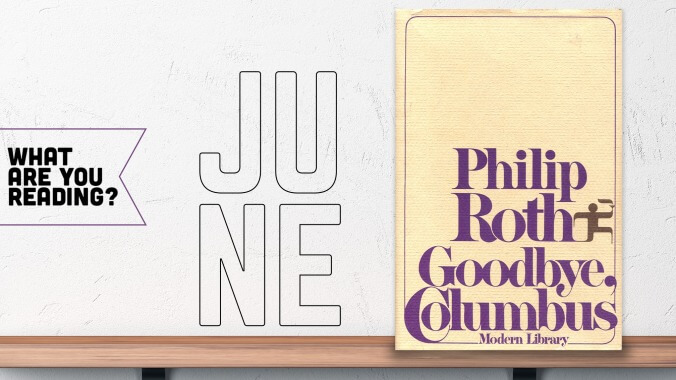What are you reading in June?


In our monthly book club, we discuss whatever we happen to be reading and ask everyone in the comments to do the same. What Are You Reading This Month?


In our monthly book club, we discuss whatever we happen to be reading and ask everyone in the comments to do the same. What Are You Reading This Month?
Revisiting Roth is practically a minor cottage industry unto itself, and I’m far from alone in seeking comfort among his words in the aftermath of his death last month. (The Atlantic was already looking back at Goodbye, Columbus in 2013, on the author’s 80th birthday.) In revisiting his first published work, what I found was an author warmer and wittier than I remembered, the volcanic force of his prose leavened with more humor than I had previously assigned it. The weight of Roth’s intellect was what first bowled me over when I read American Pastoral in my early 20s, still one of the finest books ever written about the battle for the soul of America and the broken people who inhabit it. It’s still hard to process that anyone can so effectively capture a sentiment, a state of being, that you had previously not even been able to identify within yourself; like any book that changes you, it not only shows you a new part of yourself, but it also names and explains that uncharted territory.
But here again is the novella of two young Jewish lovers in mid-century New Jersey, discovering love and ultimately bridling against the possibilities within it—or possibly succumbing to the forces without it—and the humanist heart I had previously marginalized now seems to fill the pages to bursting with affection for these confused characters and their impulsive actions. The lacerating satire is still as fierce as ever (on the suburbs: “houses where no one sat on stoops, where lights were on but no windows open, for those inside, refusing to share the very texture of life with those of us outside, regulated with a dial the amounts of moisture that were allowed access to their skin”), but fused to a warmth and empathy my younger self was too angry, or too clueless, to notice.
In Nicole Krauss’ affecting remembrance of Roth, she recalls an encounter with the novelist that saw her receiving a bit of wisdom from him: “That afternoon, I came away with a piece of paper on which he had written a short list of commandments to hang above my desk, the last of which read, ‘IT’S NOT GOING TO GET BETTER. RESIGN YOURSELF TO THIS.’” Like all of Roth’s art, it can be read as cold and cynical, but I now see the light emanating from just over the horizon of its flip, caustic tone. Resign yourself to all of this, it insists—the mistakes, the confusion, the frustration, and the pain—because that’s the same place where all the good can be found. I don’t know if I’ll ever find another author who moves me in quite the same way Roth does, but I have resigned myself to this, and am all the better for it. [Alex McLevy]
Mary Shelley’s Frankenstein; Or, The Modern Prometheus was published 200 years ago this year. Its popularity and influence are such that even if you haven’t read it, you still know the story: A scientist reanimates a dead body, and tragedy ensues. I’ve never seen the original film adaptation, which is known to have taken many liberties with Shelley’s story, but I am intimately familiar with Mel Brooks’ Young Frankenstein, which is a bit like trying to hear someone talking by listening to an echo of an echo. If you haven’t read the original novel, you, like me, might be surprised by what it does and doesn’t contain. Frankenstein: The 1818 Text, published on the book’s anniversary, returns the novel to Shelley’s first edition, which has some subtle but notable differences from her 1831 edition, from which the theater production and films were adapted. As Charlotte Gordon’s illuminating introduction explains, the initial reception of Frankenstein was poor, and Shelley altered the story a few times to make it more palatable in hopes it would sell better. Namely, she emphasizes Victor Frankenstein’s hubris in going against God and divinity; such an alteration says a lot about the Victorian society that received Frankenstein as an unnatural, uncanny story. The 1818 version I read seems to be more concerned with Victor’s responsibility to his creation than his perversion against God’s natural order. And—again, thanks to Gordon’s helpful introduction—Shelley’s own tragic childhood can be seen reflected in how Frankenstein returns over and over to a kind of parental concern, what it means to create life, and what’s owed to those we bring into the world. I also read a strong exploration of depression in Victor’s saga from acting as a manic scientist to descending into a years-long despondency, though I suppose that would’ve been described as melancholy at the time. [Caitlin PenzeyMoog]